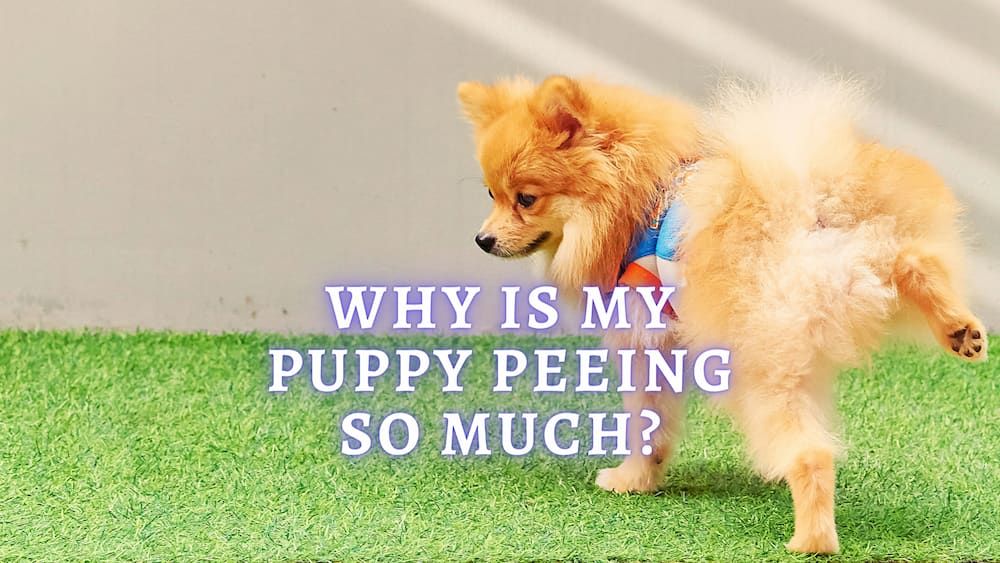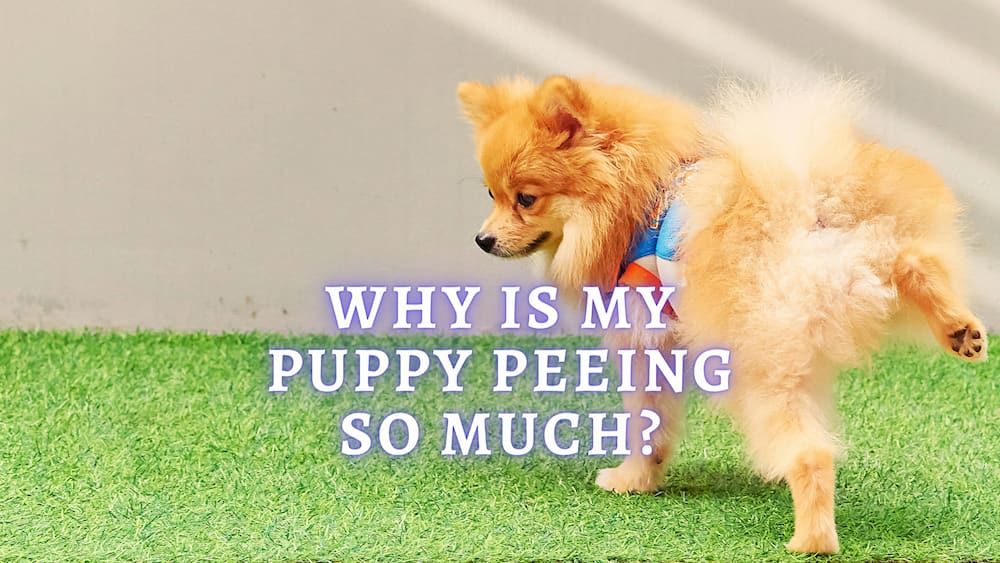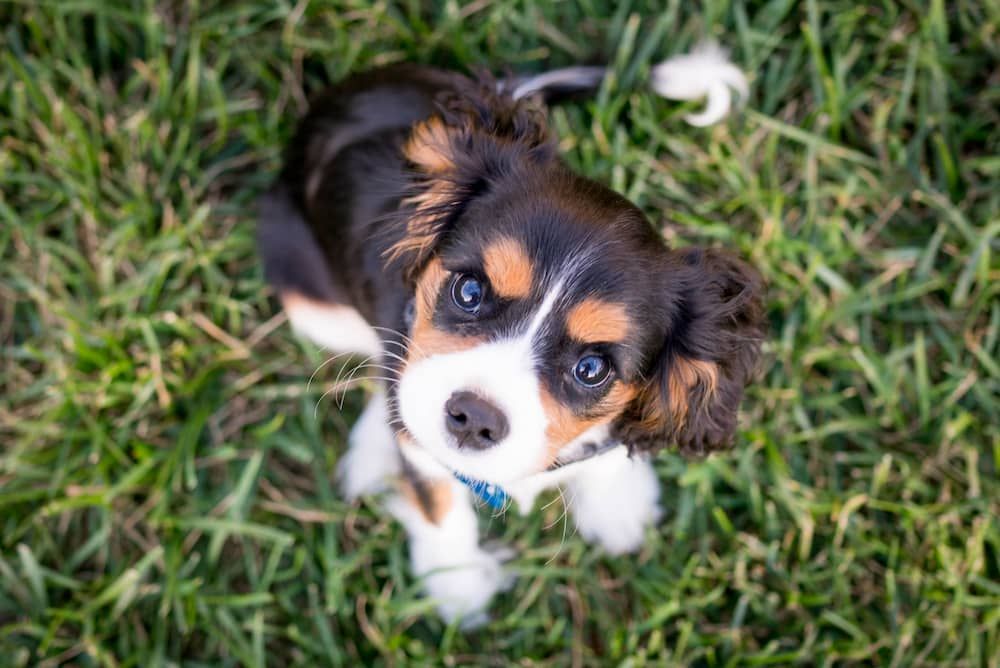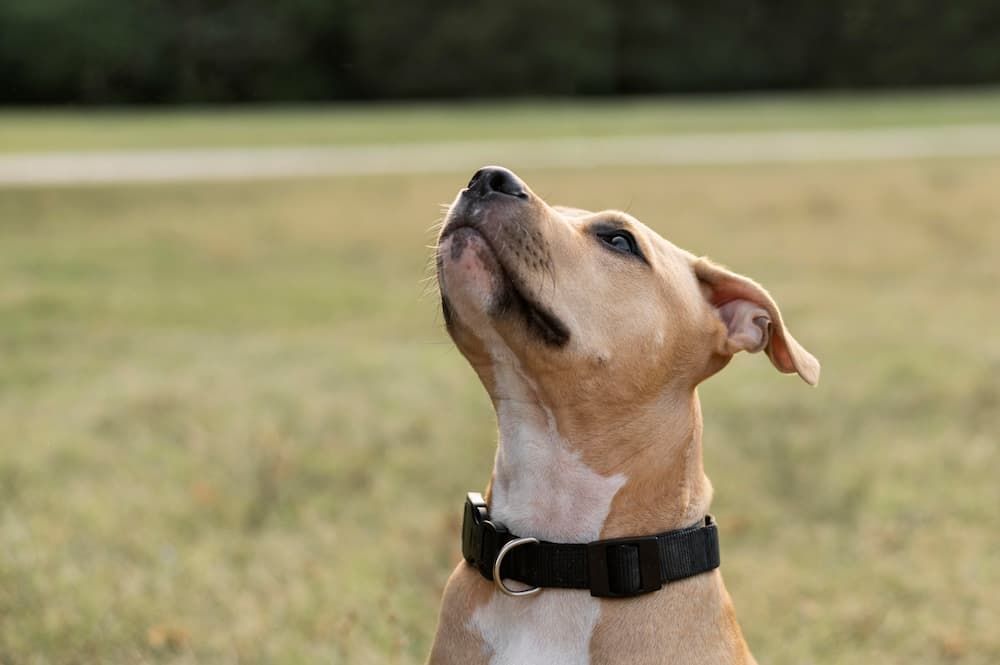
Every pet owner is concerned about the health of their puppy. It’s easy to begin to worry at the first signs of any ailment. If your puppy often goes to the toilet, it’s only normal to wonder about the health of your pet’s urinary system. In many cases, frequently urinating in puppies is nothing to be concerned about, but it’s always important to consult your local veterinarian if something is not normal. Let’s look at this article.


Photo by @aonip from Freepik
How much peeing is normal in puppies?
A puppy can be compared with a human child: both have a much faster metabolism than an adult dog and an adult person, which is why babies often go to the toilet.
Adult dogs can endure for a long time. But young puppies, whose bladder is much smaller and control is worse, should be allowed to urinate much more often.
For example, an adult dog can drink all the water in his bowl and then sleep through the night before he needs to pee in the morning. But puppies should be allowed to urinate frequently, including during the night.
However, each pet is an individual and how long a puppy can hold its bladder depends on different factors. Depending on the age of your puppy, the amount of water he consumes during the day, the environment where he is and whether he is fed on wet or dry food, will all influence how often he needs to toilet.
READ MORE: How Much Water Should A Puppy Drink?
How often does a puppy pee?
As a rule, in small puppies (younger than 6 months), the frequency of urination varies from 5-6 to 10 per day. The Cynological Academy assumes that puppies can wait the same number of hours as an adult dog when their age is about 9 months.
This means that a one-month-old puppy will need to pee every hour, and a five-month-old puppy will need to urinate every 5 hours. However, if your 5-month-old puppy needs a pee every hour or two, there is a possibility that there may be something wrong. In this case, you should consult with your veterinarian.
The following ailments are reasons why a puppy might need to urinate more frequently than normal:
Diabetes
Diabetes is a disease when the pancreas cannot produce enough insulin (a hormone used to process glucose or blood sugar). Or the body becomes insensitive to the insulin produced. As a result, there is a large amount of sugar in the blood. A common symptom of diabetes is excessive thirst, which exacerbates the problem of urination.
Diabetes can be congenital. This disease can affect dogs at any age, however is more commonly diagnosed in adulthood. It is very important to consult a veterinarian if you suspect that your dog has diabetes.
Urinary Tract Infection
Urinary tract infection, also known as infectious cystitis, can cause puppies to have frequent urination, or a feeling of urgency to pee even if there is no urine in the bladder. Urinary tract infections are usually easy to treat, although some strains of bacteria are difficult to eradicate.
Frequent dog pee is very often a symptom of cystitis. Other symptoms include:
- Frequent and painful urination (the puppy whines in attempts to pee).
- The amount of urine is small, possibly with a mixture of blood or pus.
- Irritation and swelling in the genital area.
- Frequent licking of the puppy in the genital area.
If you notice such symptoms in your puppy, you need to seek advice and treatment from a veterinary doctor. Bacteria, such as E. coli, entering your pet’s urethra and making its way to the bladder, often cause urinary tract infections. [3]
Kidney Infection
Kidney infections can cause many of the same symptoms as urinary tract infections. Kidney infections are often treatable. The most common diseases are nephritis, nephrosis, nephrosclerosis, glomerulonephritis, polycystic, pyelonephritis. Symptoms and treatment of kidney disease in dogs depend on the cause of the disease, acute or chronic form.
A nephritis is a group of inflammatory kidney diseases that are caused by infections, immune disorders, poisoning, injuries. They are characterized by a sharp decrease in appetite, weakness, an increase in body temperature. [2]
Nephrosis is degenerative changes in the renal tubules, due to which metabolic processes are disrupted, and kidney function decreases. Nephrosis occurs due to viral diseases, autoimmune disorders, poisoning, congenital kidney disorders. The first symptoms are weakness, swelling, thirst, shortness of breath, diarrhea, refusal to eat.
Nephrosclerosis is a pathological change in the kidneys’ structure – they harden, shrink and lose functionality. It occurs due to poisoning, chronic nephritis, nephrosis, allergic and infectious diseases. Symptoms in dogs: weakness, decreased appetite, thirst, problems with blood pressure and cardiac activity.


Photo by Austin Kirk on Unsplash
Bladder Stones
Bladder stones of any type can cause irritation to the bladder and blood in the urine. Stones are often painful for your puppy, and they can be life-threatening if they block the urethra exiting the bladder, so be sure to seek immediate veterinary help when you suspect this type of problem. Stones are often the result of a poor or imbalanced diet, which is why you must constantly feed your puppy nutritionally complete, and balanced food.
Kidney Stones
Kidney stones can encourage a puppy to pee frequently. However, you should definitely seek help from a veterinarian, as stones can sometimes block your dog’s ureter to the bladder, which can be a very dangerous problem.
These are the common symptoms:
- Nausea and refusal of food.
- Poor health, lethargy.
- Pain when urinating.
- The urine is cloudy or with blood.
- Too frequent urination, or vice versa, difficult or absent at all.
- Medications.
Some medications can cause a puppy (or an adult dog) to urinate more often than usual. Most veterinarians will warn you about such side effects in advance to alleviate any possible worry on your part. [1]
Cushing’s Disease
Cushing’s disease is a condition that usually affects adult or senior dogs; however, it can become apparent in younger dogs too. It is a condition where the body produces abnormal amounts of hormones from the adrenal glands, resulting in excessive thirst and urination, a pot-bellied appearance, and poor skin condition.
Ectopic ureter.
An ectopic ureter is where the ureter (the tube connecting the kidneys to the bladder) is misplaced and directly joins onto the urethra, bypassing the bladder. This causes leaking of urine frequently, which can be misdiagnosed as peeing frequently. This is a condition that is almost always picked up in puppy-hood, as it is a developmental defect, and is evident from very early on in the puppy’s life.
Possible complications of frequent dog pee
Many of these ailments are very serious, and if left untreated, can lead to avoidable discomfort and ill-health for your puppy. Some can even be fatal if left untreated, so it’s important to seek your veterinarian’s advice if you think your puppy is urinating more than usual.
veterinarian Joanna De Klerk
Preventive measures and diet
To avoid urinary ailments in the dog’s body, you need to carefully monitor the dog’s health, nutrition, and behavior. You should not feed your dog food from your table, especially smoked, salty, spicy or fatty foods.
Your dog must also have plenty of clean drinking water. When calculating the normal volume of liquid consumed, it is necessary to take into account not only water, but also other liquids your dog drinks, and whether he is also fed canned food. Overfeeding your pet is a step towards diabetes, which requires constant medication and significantly reduces your pet’s life expectancy and quality of life.
READ MORE: Best Dry Puppy Food
Behavioral Reasons Dogs Pee More Than Normal
Your veterinarian can help you treat medical problems, but if your puppy is healthy, the root of the problem is probably behavioral. Trainers or canine behaviorists can help you with these problems.
In these cases, you need to carefully educate your dog, be patient, and be persistent. For example, males like to mark territory. If sterilization is carried out, it will reduce the instinct and help to cope with the problem.
Many dogs, especially small toy breeds, pee whenever they are nervous. In the same way, it’s common for puppies to pee when they are excited. In such cases, additional exercises, stimulation, and socialization can help, but it can also be useful to provide excited puppies with a good “shelter” to which they can retreat when they are nervous.
Finally, puppies take time to become house trained. Your puppy’s frequent urination in the house might not be a sign of urinary tract issues but may simply be because he is still very young and needs to have the opportunity to go outside often.
In many cases, dogs with behavioral-related urination may need the help of a professional trainer to feel safer and stop peeing frequently. [1]
How to Deal With a Puppy Who Pees Too Much?
If signs of illness appear, you need to take the puppy to the clinic. The veterinarian will examine the dog and take blood and urine tests. In some cases, imaging of the bladder with ultrasound or x-ray may also be warranted.
The method of treatment depends entirely on the underlying cause. Often medical therapy is needed, however, some urinary ailments require surgical intervention, such as ectopic ureters and bladder stones. The treatment method and the medications used are selected by the attending veterinarian depending on the type and complexity of the disease. In some cases, the diet may also need to be reviewed.
A sick animal should be provided with a calm, quiet and warm place at home, protected from drafts. Also, provide your dog with plenty of water. If your pet urinates under herself, it’s important to wash your dog, as urine can be irritating to the skin. Medications are given strictly according to the vet’s prescription. Do not give the dog medicines intended for humans.
The water given to the animal must be clean. It needs to be changed regularly, and the dishes should be thoroughly washed. The diet should be checked for if it is nutritionally balanced. If excessive water consumption is caused by the transfer of the dog exclusively to dry food, it is necessary to provide it with constantly fresh drinking water in large quantities.


Freepik
READ MORE: How Much to Feed a Puppy
What Age Should A Puppy Be Toilet Trained?
You can teach a puppy to use the toilet outside the house from day one. Until the first vaccinations are made to the pet, you should only allow your puppy to go to the toilet in your garden and refrain from taking him on walks where he may contact other dogs.
After the vaccinations have been completed, you can start walking. Usually, the dog is about 3.5 months old at this time. In addition, from about 4 months, puppies have developed physiologically to the point where they can hold their bladder for a little longer.
To teach a puppy to the toilet, be patient. Tune in in advance to the fact that the learning process may not be too fast. Make a feeding plan (preferably together with a veterinarian). Determine the optimal amount of food and water that the dog consumes. Puppies have a speedy metabolism, and the more often they drink and eat, the more often you will need to go to the toilet. Prepare a particularly delicious treat in advance, which you will use to encourage the dog. Initially, take them to your garden at hourly intervals during the day, as well as straight after a meal. This can be reduced to four-hourly intervals at nighttime. It is best to start training on vacation or at least on weekends – you should be at home all day and be able to take the puppy out many times.
FAQ
Is it normal for a puppy to pee a lot?
Puppies have a small bladder, so they often need to pee. However, puppies who need to pee more than once an hour may suffer from health problems.
Is it normal for my puppy to pee every 10 minutes?
Small puppies may need to pee every half hour. However, frequent urination in puppies can be caused by various medical problems, including urinary tract infections, kidney problems, diabetes, and others.
Why is my puppy peeing every 30 minutes?
As a rule, small puppies (younger than 6 months) will frequently need to go to the toilet. The interval between urinations is usually around one hour for every month they are old. However, puppies have a very fast metabolism, and the more often they drink and eat, the more often they will need to go to the toilet.
How often is too often for a puppy to pee?
Young puppies should be allowed to pee much more often. On average, a one-month-old puppy will need to pee every hour, and a five-month-old puppy will need to urinate every 5 hours. If your puppy is urinating more frequently than that or is displaying other symptoms, such as ill-health, licking the genitals or seeming uncomfortable when urinating, it is important to visit your veterinarian.
{"@context":"https://schema.org","@type":"FAQPage","mainEntity":[{"@type":"Question","name":"Is it normal for a puppy to pee a lot?","acceptedAnswer":{"@type":"Answer","text":"Puppies have a small bladder, so they often need to pee. However, puppies who need to pee more than once an hour may suffer from health problems."}},{"@type":"Question","name":"Is it normal for my puppy to pee every 10 minutes?","acceptedAnswer":{"@type":"Answer","text":"Small puppies may need to pee every half hour. However, frequent urination in puppies can be caused by various medical problems, including urinary tract infections, kidney problems, diabetes, and others."}},{"@type":"Question","name":"Why is my puppy peeing every 30 minutes?","acceptedAnswer":{"@type":"Answer","text":"As a rule, small puppies (younger than 6 months) will frequently need to go to the toilet. The interval between urinations is usually around one hour for every month they are old. However, puppies have a very fast metabolism, and the more often they drink and eat, the more often they will need to go to the toilet."}},{"@type":"Question","name":"How often is too often for a puppy to pee?","acceptedAnswer":{"@type":"Answer","text":"Young puppies should be allowed to pee much more often. On average, a one-month-old puppy will need to pee every hour, and a five-month-old puppy will need to urinate every 5 hours. If your puppy is urinating more frequently than that or is displaying other symptoms, such as ill-health, licking the genitals or seeming uncomfortable when urinating, it is important to visit your veterinarian."}}]}
Article Sources:
- Gibeault, Stephanie. “Why Does My Puppy Pee in the House?” American Kennel Club, akc.org/expert-advice/puppy-information/why-does-my-puppy-keep-peeing-in-the-house/.
- Hunter, Tammy, and Robin Downing. “Pyelonephritis (Bacterial Infection of the Kidney) in Dogs.” VCA Animal Hospital, vcahospitals.com/know-your-pet/pyelonephritis-bacterial-infection-of-the-kidney-in-dogs.
- Weir, Malcolm, and Robin Downing. “Urinary Tract Infections (UTIs) in Dogs.” VCA Animal Hospital, vcahospitals.com/know-your-pet/urinary-tract-infections-utis-in-dogs.







